We've already covered the eight U.S. Senate seats which have the greatest probability of changing hands in 2026. The list includes 3 seats currently held by Democrats and 5 which have GOP incumbents. Most of the other 27 Senate seats which will have elections next year appear to be perfectly safe for the party which holds them. A few others fall just short of "perfectly safe".
Perfectly safe (or close to it) Senate seats:
- Republican: Alabama, Arkansas, Florida (special), Idaho, Kansas, Louisiana, Mississippi, Montana, Oklahoma, South Carolina, South Dakota, Tennessee, West Virginia, Wyoming
- Democrat: Colorado, Delaware, Illinois, Massachusetts, New Jersey, New Mexico, Oregon, Rhode Island, Virginia
A couple of states which are neither likely to flip nor quite 100% safe are Nebraska and Minnesota. We will also cover a few other states below -- Louisiana because of its "new" voting scheme which finally abandons the jungle primary; Alaska because it may be a close race and because of its utilization of the Rigged Choice Voting scheme which could determine the Senate winner there; also Kentucky because that's on the Democrat pipe dream list along with Alaska and Nebraska. Kentucky has one Democrat who can win statewide and he's already occupied with being a figurehead Governor who covets higher office someday -- but not the Senate, at least not in 2026.
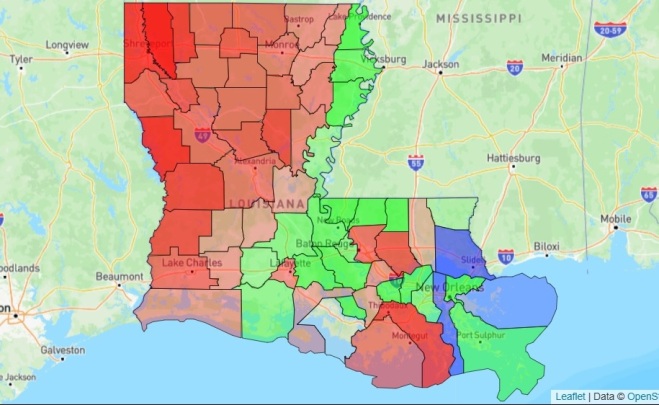 Louisiana gubernatorial jungle primary, 1987
Louisiana gubernatorial jungle primary, 1987
Louisiana:
This Senate seat is highly unlikely to slip away from the GOP next year, but it may be an interesting race.
As of 2026 Louisiana is abandoning its "jungle" primary system which was instituted in 1975 by Democrat Governor (and eventual convicted felon) Eddie Edwards. Louisiana is returning to single-party closed primaries, and that sounds like a good thing.
But it probably isn't.
In 1975 Republicans accounted for less than 10% of the Louisiana electorate and were outnumbered by as many as 2,000,000 Democrats statewide. From the end of Radical Reconstruction, Republicans were never anything close to being a viable factor in Pelican State elections. The GOP had not elected a Governor since 1876 and would never elect a Senator prior to the 21st century. Until the 1960's, Republicans were unheard of in the congressional delegation or in the state legislature. In these respects, Louisiana was no different from many other Deep South states.
By 1975 however, Edwards may have noticed that the GOP (though still largely nascent) was beginning to grow, and the Democrat Governor desired to rig the system to favor his party. In a jungle primary, all candidates regardless of party run together on the same ballot. The top two finishers -- also regardless of party -- advance to the general election which is essentially a runoff. A wrinkle which was added in Louisiana is that if any candidate achieves a majority of the vote in the jungle primary, then that candidate is declared the winner of the race and there is no general election for that office. An example of how this worked is the 2020 U.S. Senate election, in which RINO Bill Cassidy was re-elected.
In the jungle primary which took place on November 3, 2020, Cassidy faced 14 challengers (5 Democrats, 1 Republican, 1 Libertarian, 7 independents), exactly zero of which posed a serious threat -- all 5 Democrats combined added up to only 36% and the one other Republican contender barely registered a pulse. Cassidy won with 59.3% of the vote. Had his percentage not exceeded the magic number of 50, he would have been forced into a runoff with the second-place finisher.
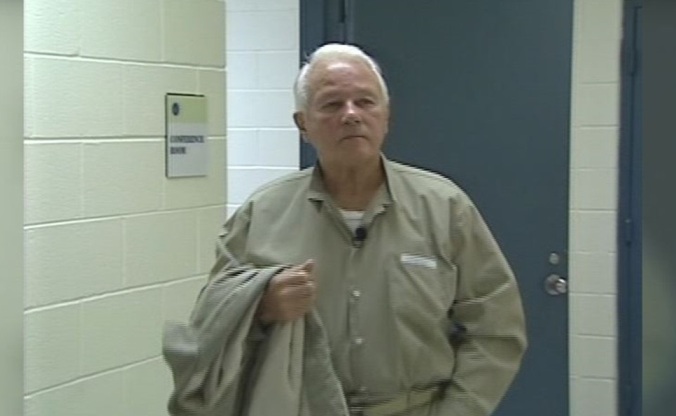 Photo of inmate No. 03128-095 from wwltv.com
Photo of inmate No. 03128-095 from wwltv.com
What really triggered Edwards was the February, 1972 gubernatorial race, in which he first won the Democrat primary against over a dozen other candidates (but did not even get 25% of the vote) and then narrowly prevailed in a grueling runoff against Bennett Johnston and then had to face Republican David Treen in the general which turned out much closer than expected. Treen had cruised easily through the GOP primary and did not need to endure any runoff. So why, Edwards asked, should the vastly outnumbered Republican party be guaranteed a spot on a general election ballot like in every other state, while Democrats had to face as many as two bruising contests just to get to that same spot?
The answer to that question, beginning in 1977, was to make Republicans in Louisiana into an effectively-disenfranchised minority group. Until the 1990's, the majority of statewide general elections in Louisiana were Democrat against Democrat. Furthermore, when no general election was needed because someone got over 50% in the jungle primary, that "someone" was always a Democrat.
This contrivance worked well for Louisiana Democrats for a long time. But Treen was elected Governor in a 1979 upset and by the 1980's the GOP at least fielded a candidate in most elections. Although after Treen won it was 16 years before another Republican was elected Governor, and it wasn't until 2004 that Republicans elected their first U.S. Senator from Louisiana. Democrats continued to dominate other statewide offices as well.
As of 2004 the tide had turned, and Democrats (and liberal Republicans) knew it. Then came the mass exodus of New Orleans Democrats as the result of Hurricane Katrina in 2005; New Orleans was already in population decline but the hurricane momentarily accelerated the process. From that point forward it has been Democrats who almost always find themselves on the outside in a general election, not simply because New Orleans temporarily lost about 100,000 potential voters, but because the general preference of Louisiana voters has done a 180-degree turn away from Democrats and towards Republicans. Since 2007 only Dirty Mary Landrieu in 2008 and John Bel Edwards (fluke wins in 2015 and 2019) have been able to prevail statewide as Democrats in Louisiana.
Liberal Republicans like Bill Cassidy have (along with Democrats) lately decried the jungle primary, and in 2024 the state legislature passed a bill which reverts to closed, single-party primaries for elections for federal offices effective as of 2026; elections for state and local office in Louisiana will continue with the jungle primary. The new scheme is a "win" for liberals of both parties: Democrats get a guaranteed spot on a general election ballot; RINOs no longer need to deal with Democrats taking votes from them in a primary, and thus stand a better chance against real Republicans.
In a supposedly "closed" GOP primary, Cassidy will receive a higher percentage of votes than he would in a jungle. He will be the winner if several conservative candidates split the right-wing vote while Cassidy has all of the left-wing votes for himself. Most likely, however, Cassidy will still need to survive a primary runoff. That won't be as difficult as it may sound. One very important provision of the new law which eliminated the jungle primary is that independent voters -- and there are plenty of those in Louisiana (nearly 30%) -- can cast a ballot in whichever primary they choose. Take a bunch of "moderate" independents, add in some Democrat voters who switch and become Republicans temporarily, and RINOs are suddenly far less endangered than they were before. If Cassidy's fate was decided only by true Republicans, it wouldn't be pleasant for him.
Cassidy's #1 opponent at the moment is state Treasurer John Fleming, a 74-year-old Republican. Democrats have nobody worth mentioning. Fleming served 4 terms in the U.S. House from the 4th District from 2009-2016; the guy who replaced Fleming in that district in 2016 is now the Speaker of the House. Fleming is a very solid conservative, and if other conservatives stay out of the May, 2026 Senate primary, Fleming has an excellent chance to win. November would be a formality. But the primary will not be so simple, and that works to the advantage of RINO incumbent Cassidy because the non-RINO primary vote will be fractured. Other prominent candidates include first-term state Senator Blake Miguez, who is a moderate-conservative; and St. Tammany Parish councilwoman Kathy Seiden, who is a young, attractive Christian conservative.
 Photo credit: wwltv.com
Photo credit: wwltv.com
Cassidy has a major cash advantage, Miguez and Fleming are building their war chests, and Seiden has only recently thrown her hat into the ring. Whoever wins the GOP primary will be Louisiana's next U.S. Senator. Miguez, though more of a centrist, will still take more votes from Fleming and Seiden than he will from Cassidy. Best case scenario is that at least one of the two actual conservatives makes the runoff. With one Democrat now guaranteed to be on the general election ballot (thanks again, Louisiana RINOs) billionaire ActBlue contributors may go all-out to try to steal this seat, but this is one state where it is very unlikely that they will succeed.
Alaska:
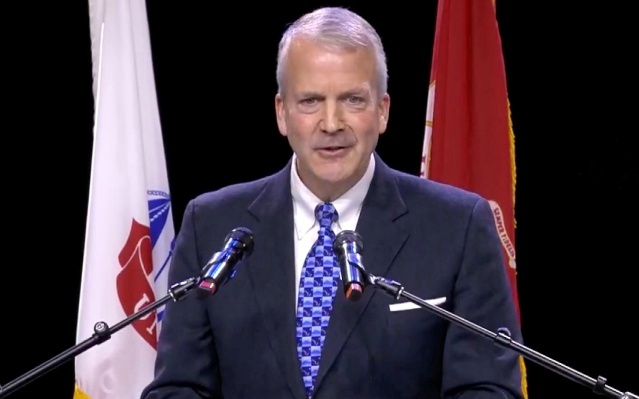
Democrats have nobody yet for this race in what people falsely assume is a Republican state; the GOP has only 24% of voter registrations in Alaska while 59% are registered independents. But the Democrats believe (and left-wing polls back them up) that fake-moderate ex-congresswoman Mary Peltola would be a formidable opponent against incumbent Republican Dan Sullivan. Sullivan, an actual moderate, was first elected to the Senate in 2014 when he defeated incumbent Democrat Mark Begich and then was re-elected in 2020 by an unimpressive margin over big-spending liberal Al Gross.
An obscure former state legislator from the outback, Peltola entered the spotlight in August, 2022 when she reaped the full benefit of Alaska's Rigged Choice Voting (RCV) election system and won the House seat of the departed Don Young by taking 39.7% of the vote in a special election. Sarah Palin's entry into that race split the GOP vote (which totaled 58.7%), and after RCV worked its black magic Peltola was declared the winner. She won again in November against the same two GOP combatants. Republicans finally got smart in 2024 and stopped the internal warfare, with Nick Begich winning the House seat he had been denied twice previously. Democrats desperately want Peltola to run for something in 2026, whether it be Governor, Senator or House, because no other Democrat seems to be remotely viable. Alaska's filing deadline isn't until June, so the "Peltola Watch" may go on for some time.
Peltola may have a greater chance at becoming Governor rather than Senator because no Republican (so far) is stepping up to plausibly challenge Sullivan; the GOP vote will not be split, and Sullivan's squishiness will appeal to so-called independents who might otherwise vote for a Democrat. However the Governor race is wide-open and numerous Republicans will be splitting the vote in the jungle primary and probably in the general election too. If Peltola gets into that race, other Rats will flee. The over-abundance of Republican wannabes gives Democrats and Peltola the perfect opportunity to use Rigged Choice Voting to their advantage again, a la 2022.
Even if Sullivan wins another Senate term in 2026, Alaska still might hand Senate control to the Democrats. As we first predicted over 3 years ago, if Senate control hangs in the balance, uber-RINO Alaska Senator Lisa Murkowski will almost certainly switch parties -- either ending her charade and becoming a Democrat, or going the Independent route and caucusing with the Dems -- and hand the Senate over to the Rats. The GOP majority hasn't been thin enough yet for this grandstanding attention whore to make any difference in that manner, but after 2026 it very well might be. Or Republicans may lose outright, and Murkowski might switch just to be on the winning team and get some better committee assignments in the last two years of her final term (before voters kick her to the curb in 2028 -- hopefully).
Murkowski previewed her intentions here, a few months ago.
Kentucky:
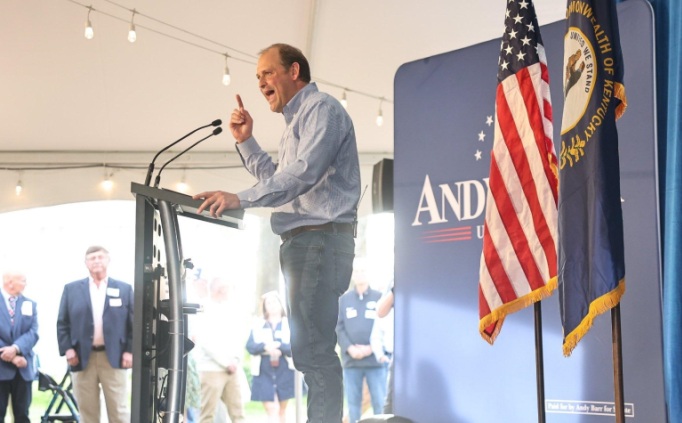 Photo credit: Lexington Herald Leader
Photo credit: Lexington Herald Leader
The Bluegrass State is wide open due to the long-overdue retirement of Mitch McConnell. The best-known candidates in the Republican primary are moderate congressman Andy Barr and former Attorney General Daniel Cameron. Barr has represented the Lexington-area district in Congress since 2013 and he's turned what was once a marginal House seat into a rather safe one which Democrats no longer seriously go for in most elections; they are putting it back on their radar in 2026, however. Cameron, elected as A.G. in 2019, was seen by some on the right as insufficiently tough on Democrat crimes while in office, and his bid to move up to Governor ended dismally when he was totally outclassed (and vastly outspent) in 2023. There is also businessman Nate Morris running on the GOP side, and he is definitely the most conservative option of the three. Barr is currently the leader in the fundraising portion of the race.
Democrats seem to be pinning their hopes on one of two female statewide failures:
- Amy McGrath, who once wasted $8 million running against Barr in the 6th District and couldn't even win in hyper-Democrat 2018. The national party again spared no expense in 2020, spending nearly $100 million on McGrath as she failed to defeat the unpopular McConnell for the Senate. She won 3 counties. McGrath's 2026 campaign is built around "I hate Donald Trump, just like you do!" and nothing else aside from wrapping herself in the flag and posing as a patriot because she once was in the military. Democrats often try that approach; it seldom works outside of "blue" states (where that sort of thing isn't necessary and is probably counterproductive).
- State House Minority Leader Pamela Stevenson, who represents a Louisville ghetto district. Stevenson doesn't appear to have much of a campaign organization yet. Stevenson ran for Attorney General in 2023 and lost by 16 points even as Empty Suit Andy Beshear was winning at the top of the Rat ticket. Stevenson, like McGrath, also has military cred, having once been in the Judge Advocate General's Corps in the U.S. Air Force.
- There is also former CIA spook Joel Willett, the Deep State entrant into the race; Kentucky's version of Virginia's Abby Spanberger, but without any electoral history. He's trying to seize the all-important Democrat "Working Class Hero" (W.C.H.) designation for himself, and also has the "victim card" handy; this guy who nobody's ever heard of is apparently such a menace to GOP chances in the 2026 election that he claims to have received death threats from Republicans.
A recent addition on the Democrat side, presumably for additional comic relief, is horse trainer Dale Romans. Horses are big in Kentucky, and this guy's full of as much horseshit as any of them. He also wants to be the W.C.H. candidate in the contest, and describes himself as an "independent" Democrat even as he spouts the same nonsense as all other (presumably non-independent) Democrats. Bernie Sanders is an "independent" too.
McGrath is the most likely of the above to be the Democrat nominee, but nobody currently has any illusions that she will win. Morris may have a better shot than anticipated on the GOP side, but a squish like Barr probably has the best chance of winning a general election, and therefore the big money and big endorsements will be behind him. Cameron is currently being slimed with unproven allegations of misconduct while Attorney General, and he is also a proven statewide loser. Cameron appears to be the favorite to finish third in the GOP primary.
Minnesota:
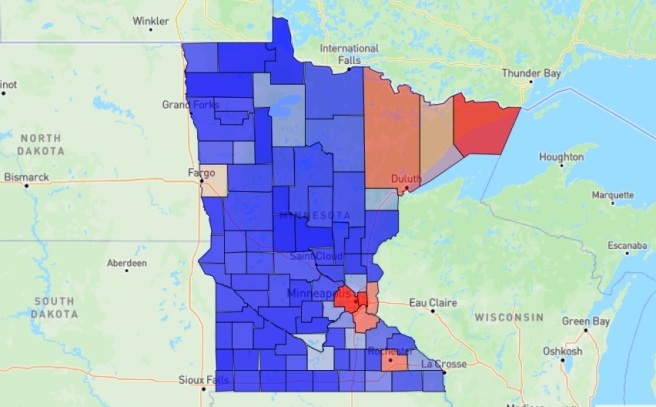 2024 presidential results in Minnesota
2024 presidential results in Minnesota
This state, like Virginia (see below) is nothing but a Republican pipe dream. The congressional delegation is always pretty well balanced, either 4-4 or 5-3 every election since 2000. The state House and state Senate are very close. Minnesota doesn't register voters by party, but a company whose business it is to estimate party breakdowns calculates that Minnesota is one-third Democrat, one-third Republican and one-third independent or minor parties. This may be an oversimplification, but the Twin Cities and their suburbs (at least the first two "rings") are terrible, the rest of the state is fine. The first part of that sentence is definitely true, anyway.
When it comes to statewide elections, the GOP sometimes comes close -- but never wins. Trump won every single county in Minnesota except 4 in the Twin Cities area, 3 in the Arrowhead Region, and the counties containing Rochester and Moorhead. He still lost by 4 points, which isn't too bad a showing for a Republican in the Great White (75% and dropping) North. But the last time a Republican presidential candidate won in Minnesota was back in 1972 -- 53 years ago. There's usually some hope but it's always false hope.
It's no different in other statewide elections. From 2008 to 2024 there were 23 non-presidential statewide elections in Minnesota, for offices ranging from Governor and U.S. Senator to Auditor, Attorney General and Secretary of State. Only one candidate (Amy Klobuchar) has ever exceeded 55% of the vote during those years, and she's done that 3 times. The other 20 elections were close. Democrats won all 20 of them.
 Photo credit: house.mn.gov
Photo credit: house.mn.gov
Speaking of "pipe dreams". . . one explanation for some of the previously close outcomes is -- or was -- the presence of doper parties on the ballot. The "Grassroots-Legalize Cannabis" party and the "Legal Marijuana Now!" party are both recognized political entities in Minnesota, but they ceased fielding candidates after 2022. That's because they no longer have any reason to do so; in 2023 the Democrat legislature passed a very lenient law which legalizes cannabis for any type of use, not just medicinal. The fact that the doper parties are now obsolete helps Democrats, because these parties were regularly siphoning off thousands of left-wing votes in major elections.
Republicans are pretending that they have a chance to pick up the Minnesota Senate seat in 2026. It is an open seat, being vacated by Democrat Tina Smith, who is retiring. Smith, who compiled a nearly 100% liberal rating while in the Senate, was first appointed in 2018 when Democrats forced another liberal Democrat, sexual predator Al Franken, to resign. Smith's most recent election in 2020 was a good example of how Democrats were once hindered electorally, as two stoner candidates combined to take 7.7% of the vote away from her. So Smith only won by about 5 points instead of 12 or 13 points.
The 2026 Democrat primary will be between Lt. Governor Peggy Flanagan and congresswoman Angie Craig. Flanagan has some problems, such as financial improprieties in her office, and being endorsed by Bernie Sanders; Craig is one of those lifelong liberals who suddenly sprints hysterically towards the center when seeking higher office. There's a 98% chance (rounding down) that one of these two will be the next ultra-liberal U.S. Senator from the state of Minnesota.
Ex-professional basketball player Royce White ran for the Senate in 2024 in Minnesota against Amy Klobuchar, and the Republican was stomped by over 15 points, a good example of a margin of Democrat victory when the dopers no longer split the left-wing vote. He is running again in 2026. White moved quickly across the political spectrum, going from left-wing hero in 2020 when he was leading Black Lives Matter protests after the death of "St. Floyd of Fentanyl" (White does have a history of mental illness); he's recovered from that, and is now described as a "right-wing populist". White has just as much chance of winning in 2026 -- none at all -- as he had in 2024. And he is the probable front-runner among Republicans, which shows just how much of a barren wasteland Minnesota is for the GOP. None of the state's 4 moderate Republican congressmen want any part of this race either.
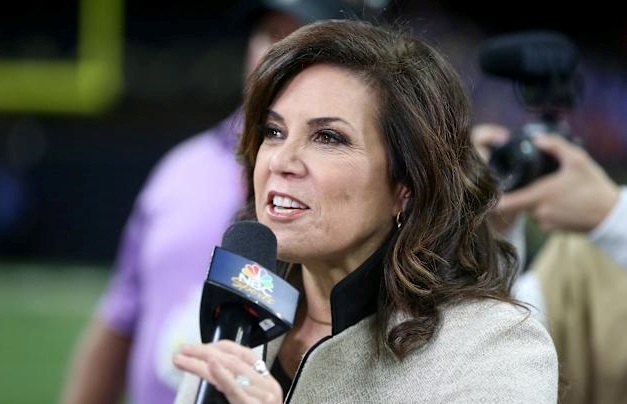 Photo credit: yahoo.com
Photo credit: yahoo.com
This foregone conclusion of an election might be spiced up a bit if ex-sports broadcaster Michele Tafoya were to enter the race on the GOP side. Tafoya was a long-time sideline reporter for NFL games, and during her career she was employed by several networks including CBS, ESPN and NBC. She retired from that profession in January, 2022; the last game she worked was Super Bowl LVI.
Tafoya, a self-described "pro-choice conservative with Libertarian leanings", is now a political commentator, doing podcasts from her home in the suburban Twin Cities area. She has been rumored as a potential candidate for the Minnesota Senate seat, but has not yet made any move towards running. The main challengers to White for the GOP nod are a pair of retired Navy veterans, Adam Schwarze and Tom Weiler, neither of whom have any political experience -- which isn't necessarily a bad thing -- but they have no name recognition (or sufficient funding, or a prayer of winning) either.
Nebraska:
 Photo credit: Zach Wendling/Nebraska Examiner
Photo credit: Zach Wendling/Nebraska Examiner
Democrat-in-disguise Dan Osborn is the Great "Independent" Hope for the left in the state of Nebraska. Fresh off of a defeat in the 2024 Senate election against incumbent GOP squish Deb Fischer in which he came closer than some expected, Osborn is rested and ready to give it another go in 2026. Osborn took all of the Democrat money he could get in 2024, but concealed his true political identity by refusing to accept the Democrat party label which is repugnant in the Cornhusker State outside of Omaha and Lincoln. Not even including all of the supposedly-independent liberal cashflow coming from outside the state, Osborn's fundraising dwarfed that of Fischer. Numerous polls showed a close race in 2024, and some even had Osborn prevailing by a small amount. Osborn won the two big liberal cities and lost everywhere else; the final outcome was a 6.7% victory for the Republican. Only one or two forecasters actually got it right; the other polls (nearly all of which were paid for by Osborn's campaign) were nothing but wishful thinking, propaganda and hot air.
Osborn's opponent in 2026 will be Nebraska's other squishy moderate Senator, Pete Ricketts.
Ricketts, the former two-term Governor of Nebraska, was appointed in January, 2023 to fill the Senate vacancy caused by the resignation of rabid Trump-hating Republican Ben Sasse. Ricketts then easily won the 2024 special election to fill the remainder of Sasse's unexpired term.
That effortless win came against a Democrat, and defeating any Democrat statewide is a slam dunk in Nebraska these days. In 2024 the national party kept its support of Osborn a secret until the final days of the campaign. National Rats are now out of the closet, and have proudly endorsed the faux independent for 2026. They have yet to support Osborn with the big money which will enable him to easily outspend Ricketts (but that will come). For his part, Osborn is careful to appear in flannel shirts, holding a hunting rifle if possible, and making sure to stress that he was once a member of Organized Labor. So unlike most Democrat "working class hero" wannabes, this guy really did once-upon-a-time work for a living before becoming a politician.
Just like in 2024, the polls purport to indicate a close race. Just like in 2024, those biased polls are very likely to be wrong when the votes are counted. But Democrats have all the money in the world, as they have conclusively shown in recent years, so why not spend it -- even on an "independent", even in a normally unwinnable state?
Because 2026 just might not be a normal election year.
Virginia:
One last word about a ridiculous GOP pipe dream state: there are probably some folks out there who are still in disbelief regarding the 2025 election results in Virginia. Unwilling to accept the reality that the Old Dominion is not remotely competitive anymore, they may think that outgoing Republican Governor Glenn Youngkin could somehow repeat his fluke win from 2021 in the 2026 Senate race against well-entrenched liberal Mark Warner.
Youngkin is a good man, and he stood up just recently against Virginia Democrats' attempt (which will succeed) to gerrymander the state's congressional districts and disenfranchise Republicans, costing them 2 or perhaps 3 seats. Youngkin is not a stupid man, and to all indications will not be entering a Senate race that he is extremely unlikely to win. If Youngkin declines, Republican pickup chances of the Virginia Senate seat drop from maybe 20% to absolute zero. Drop the pipe, wake up from the dream, and look elsewhere for potential Republican pickups.
Tags:
2026
Senate
Louisiana
Alaska
Kentucky
Minnesota
Nebraska
Virginia
|
Over the past few days, two moderate Republicans have announced that they will not be seeking re-election in 2026: Rep. Don Bacon of Nebraska and Senator Thom Tillis of North Carolina. Both of these anti-conservative politicos have taken great pride in being a thorn in the side of the majority of their party, and they bask in the positive media attention they get when they oppose President Trump.
Trump normally saves his greatest degree of vengeance for those who oppose him from the right (such as ex-Rep. Bob Good or current Rep. Thomas Massie) while going easier on Republicans who come at him from the other direction (such as Impeachment RINO Dan Newhouse of Washington), and he nearly always endorses squishy moderate incumbents over conservative challengers even in the safest of Republican districts. However, Trump recently declared War on Tillis and, probably as a result of that, Tillis has decided to scram. Trump's reaction notwithstanding, Tillis did not become a darling of the left only recently; he had already sealed his probable re-election fate months earlier.
Fried Bacon:
 Photo credit: AP Photo/J. Scott Applewhite
Photo credit: AP Photo/J. Scott Applewhite
Although he did not make the official announcement until June 30, there had already been chatter that Bacon was through after this term. He was first elected alongside future nemesis Donald Trump in 2016, defeating erratic Democrat incumbent Brad Ashford by 1.2%. Ashford started out as a Democrat, switched to Republican, then became an Independent, then back to Democrat again. He used his scattershot background to provide cover for his natural liberalism; although Ashford campaigned as a moderate he nearly always voted as a liberal during his lone term in Congress.
Bacon survived the anti-Trump liberal landslide of 2018 because the so-called moderate Ashford was edged out by far-leftist Kara Eastman in the Democrat primary that year; Ashford would have likely won the general election rematch, but Bacon lucked out by having a more "progressive" opponent who repelled enough moderate voters to seal her defeat.
Bacon was truly a moderate during his first term and part of his second one (2017-2019) but he began to panic and/or seek liberal media approval for his "maverick" status during the COVID year, and his voting record jumped noticeably to the left. His record has stayed that way ever since. It could be successfully argued that, as bad as Bacon is, he remained a good fit for his ever-deteriorating district (NE-2) which is based in and around the city of Omaha. Bacon won 5 times without ever getting even 52% of the vote in this highly marginal district, which is impressive in its own way.
Bacon's greatest achievement was his most recent victory in 2024. It's rare that a long-term House incumbent suddenly becomes an underdog absent some scandal or adverse redistricting (neither of which applied to Bacon in 2024), but liberal Democrat Tony Vargas was leading in every poll taken from mid-August on and nearly every prognosticator -- including us -- expected Bacon to lose; he won by 1.8% in one of the most surprising outcomes on election night.
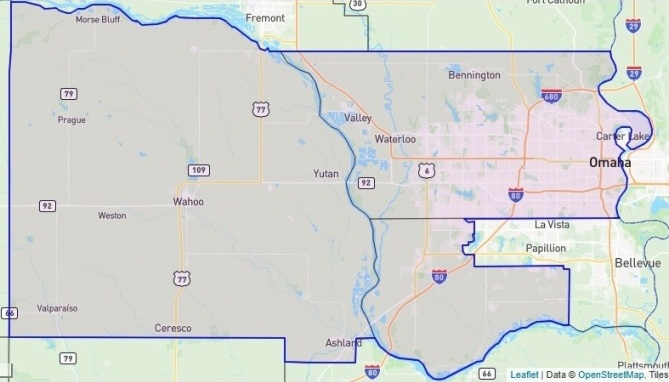 Nebraska congressional district 2
Nebraska congressional district 2
Nebraska's Second Congressional District contains all of Omaha, and the city comprises 75% of the district. It is the other 25% which (so far) has kept this a Republican seat in the House. By 2024, the White percentage of the district was down to approximately 65% (it had been 80% as of the early 2000s) while the Hispanic percentage continues to rapidly increase. This district -- which awards its own Electoral Vote in presidential elections -- not only has rejected Trump twice in a row now, it also voted heavily against incumbent Republican Senator Deb Fischer in 2024, preferring "independent" Dan Osborn by a whopping 12 points. NE-2 did vote Republican for Governor in 2022 and for the other Senate seat (Ricketts) in 2024, however it was by the narrowest of margins. Led by Omaha, the district is obviously trending leftward and is now rated as D+2. Even as recently as 2020 it was rated as leaning to the right by a miniscule amount, but those days are gone.
John Gizzi -- who at one time was a respected political analyst for the conservative publication Human Events but now in his dotage regularly reveals himself to be a member in good standing of the GOP establishment -- crafted an article for Newsmax on June 26 which correctly anticipated Bacon's departure. That article contains a couple of errors however, one of which is a hilarious whopper but quite appropriate for an establishment RINO to make.
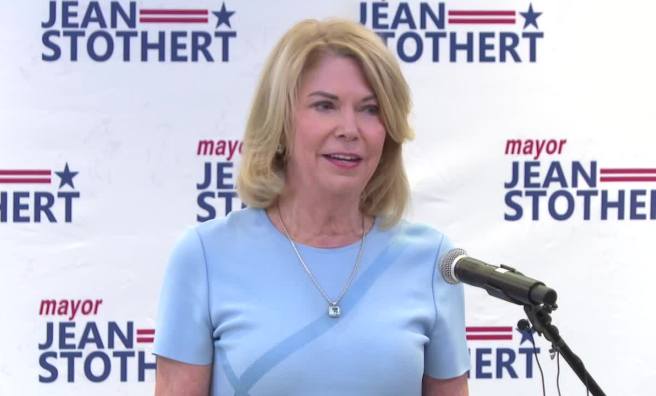 Photo credit: 3newsnow.com
Photo credit: 3newsnow.com
Minor error #1: former Omaha Mayor and nominal Republican Jean Stothert (elected in 2013, 2017 and 2021) is not a transvestite and therefore is not a "he" as a quote from the article states; a minor error but one which reveals a certain amount of cluelessness on the part of the quoter, who was a former chairman of the Nebraska Republican party. That guy did get one thing right -- Stothert is surely no conservative. Stothert had her easiest election in 2021 when three liberal Democrats split the primary vote and could not reunite in time for the general election one month later. Stothert lost in May of 2025 by almost 13 points to a liberal black Democrat, conclusive evidence of how the city of Omaha has finally completed its journey to the dark side. Even granting that Stothert's general election campaign in 2025 was sabotaged by Republican primary loser Mike McDonnell (who spitefully endorsed the Democrat), it seems that even moderate Republicans no longer need apply for electoral employment within the city limits.
The mayor of Omaha is technically a non-partisan position (like the state legislature) but the parties of the candidates and officeholders are rarely a secret.
Major error #2: Gizzi's own blunder in the article is a real howler: claiming that Brett Lindstrom, the presumptive GOP nominee for the open NE-2 seat in 2026, is "considered a strong conservative". In reality, Lindstrom is just so much leftover Bacon. He can usually be found on the left flank of the Republican party in Nebraska and at one time was the most liberal Republican in the Nebraska state legislature. During his time in Lincoln, Lindstrom's conservative ratings from CPAC were:
2015: 64%
2016: 54%
2017: 75%
2018: 73%
Having moved to the right while running for re-election for the first time in 2018, Lindstrom was safely returned to office for a second term -- and safely returned to being the liberal which he really always was. When he decided that he wanted to be Governor and would therefore have to appeal to conservative voters statewide by moving rightward (if he could win the primary while running to the left) -- a neat trick, but a common one for liberal Republicans -- Lindstrom began moderating his voting record in 2020.
2019: 52%
2020: 63%
2021: 64%
2022: 80%
In 2022 Lindstrom was absent (or failed to take a position) for nearly half of all key votes including one on abolishing the state income tax and another vote on preventing election fraud.
In 2022 Lindstrom finished third in the GOP primary for Governor. Moderate Jim Pillen won that primary (and then the general election, easily) and conservative Charles Herbster finished second after leading in the polls; he was slimed with some Clintonian-type accusations of sexual indiscretions. Herbster was endorsed by Donald Trump and others on the right; Pillen had all the moderates in his corner; Lindstrom was supported by some ex-Republicans who became Democrats, and he was endorsed by moderate-liberal Omaha Mayor Jean Stothert.
Even a squish like Pete Ricketts (a Pillen supporter) considers Lindstrom to be too liberal. Here is a quote from Ricketts which appeared during the '22 gubernatorial campaign: "Brett Lindstrom raised the gas tax 23%, opposed voter ID, gave taxpayer benefits to illegal immigrants, repealed the death penalty, and even tried to gut the Property Tax Credit Relief Fund. It's no wonder Democrats are supporting Lindstrom -- his liberal record speaks for itself."
And this guy is the best we can do while trying to hold the NE-2 House seat? Sadly, that may be the case.
Toasted Tillis:
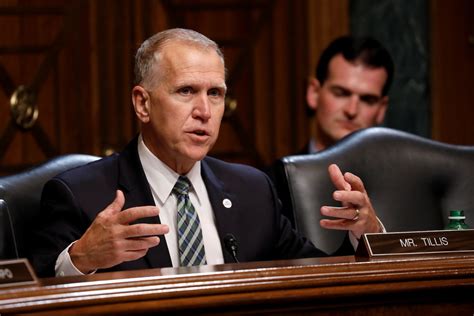 Photo credit: Washington Post
Photo credit: Washington Post
Business executive Thom Tillis was elected to the North Carolina state House in 2006 after one term as a city commissioner. Tillis compiled a conservative voting record (but was a more bipartisan type aside from some of his positions on key votes) during his 4 terms, and was Speaker of the NC House from 2011 through the end of his tenure there. True conservatives very rarely ascend to the position of Speaker even in the most conservative of states, and North Carolina isn't one of those anyway.
Liberal Democrat Kay Hagan, defeater of Elizabeth Dole and a rubber stamp for the Obama agenda in the Senate, was up for her first re-election bid in 2014. Polls showed her as being increasingly vulnerable heading into that election year, and numerous Republicans were considering opposing Hagan. Tillis jumped into the GOP primary as the favorite and received endorsements from high-profile squishes like Mitt Romney and Jeb Bush. Tillis' major opponent for the nomination was conservative "activist" and physician Greg Brannon. But Brannon was not a serious threat, never led in any poll against Tillis, and finished second in the primary, with 27.1% to 45.7% for Tillis.
For the general election, Democrats flooded the state with oodles of money on behalf of their doomed candidate and additionally invested $36 million in "independent" expenditures against Tillis. Despite the massive disparity in funding in favor of the Democrat (an extremely common occurrence in Senate elections in recent years), Tillis eked out a 1.5% upset victory over Hagan.
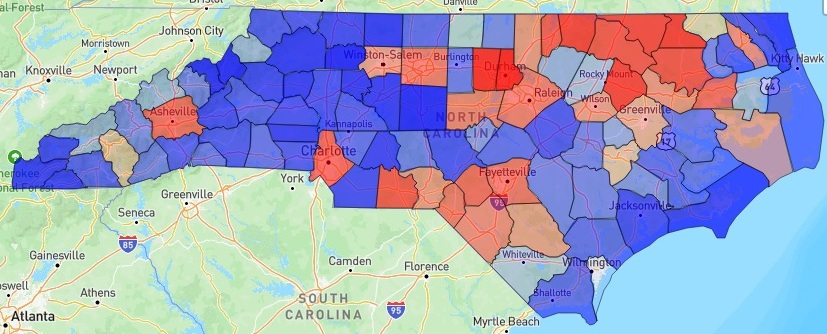 North Carolina Senate election results, 2014
North Carolina Senate election results, 2014
Tillis carefully walked a line down the middle of the road during his first two Senate years (2015-2016) which corresponded with the final two years of the Obama administration. Desperately seeking to project an image of moderation in his sharply divided state, Tillis supported Obama somewhat more often than he opposed the president on Senate votes. Tillis was a staunch (though not entirely reliable) supporter of Donald Trump during Trump's first term in office.
In 2020 Tillis faced another big spender, Democrat Cal Cunningham. Cunningham, a former U.S. Army lawyer, tried to portray himself as a sensible, patriotic moderate who was not on board with fashionable radical leftist causes like "Black Lives Matter" and "Defund the Police". As in 2014, Tillis -- though now having the advantage of incumbency -- trailed throughout the COVID summer and into the fall. Even the final polls predicted a 2-4 point win for Cunningham. A month before the election, the married Democrat patriot was found to have engaged in "sexting" with a woman not his wife. These revelations were typically downplayed by the media and Cunningham suffered no damage in the polls. But just like in 2014, Tillis pulled off the upset and prevailed by a small margin in November.
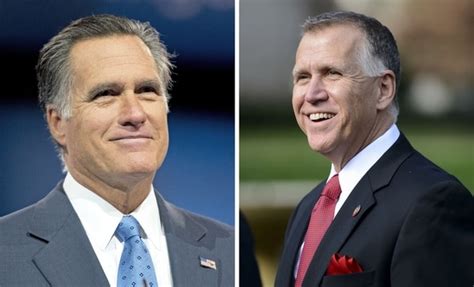 Romney and Tillis: Birds of a Feather
Romney and Tillis: Birds of a Feather
Photo credit: newsmax.com
With Trump safely out of the picture now, Tillis emerged as even more moderate (actually, liberal) than he had been in the past; his support for the Biden administration's policies and his opposition to conservative principles were both running in the 40% range from 2021-2024; that's Mitt Romney territory, though not quite as reprehensible as Susan Collins or Lisa Murkowski.
Trump's return to the White House has caused Tillis to largely abandon whatever was left of his principles. All politicians (not just Donald Trump) have massive egos, and few of them have larger egos than the "Elite 100" who occupy the United States Senate. Tillis, among some others, objects to the pressure to blindly obey the president's every wish regarding legislation. Occasionally in 2025 this is a good instinct for a Republican, but most of the time it is not. Tillis began the second Trump administration by railing (and voting) against worthy presidential nominees like Pete Hegseth for Secretary of Defense and Ed Martin for U.S. Attorney for the District of Columbia. Tillis singlehandedly derailed the Martin nomination and his ex-sister-in-law was the driving force behind the smear campaign against Hegseth. So Tillis wasn't just voting the wrong way -- he was doing much more damage than that, whether directly or indirectly.
Those actions, along with his other recent anti-conservative tendencies, made Tillis' 2026 re-election prospects quite dubious. The last straw was his vote against the "Big Supposedly-Beautiful Bill", which triggered Trump's wrath. Tillis The Moderate would be highly vulnerable in the Republican primary while remaining an underdog in the general, still reviled by North Carolina Democrats no matter how much of a centrist he thinks he is now.
NC Senate outlook for 2026:
So-called experts have designated the 2026 Senate election in North Carolina as a tossup, but anyone with multiple functioning brain cells would forecast exactly the same thing. No expertise is necessary to see that we are likely heading for another super-close statewide election in a state which specializes in such results. Hopium addicts on the right insist that North Carolina is a solid "red" state, but it is nothing of the sort even though it has voted Republican for president 11 of the last 12 times.
The last 5 presidential elections in North Carolina have been decided by an average of just 2.1%. The margin of victory in recent elections for Governor or Senator averages somewhere in the 5-6 point range. The outcomes of statewide row-office elections are even closer, with only two opposed candidates getting even 55% of the vote (and then just barely) in the past 13 years, covering a total of 35 elections.
The 2026 Senate race was a tossup from the beginning, whether Tillis ran or not.
The top Democrat contender is obviously former Governor Roy Cooper, who should be announcing his entry into the race any minute now. Cooper's average percentage in his two elections for Governor was barely 50%, yet he comes in as the favorite to be the next Senator from North Carolina. His token opposition in the Democrat primary would be one-term former congressman Wiley Nickel, a liberal carpetbagger who spent his life in California and Washington DC before migrating to North Carolina a few years ago. He won a close House race in 2022, but when the Democrat gerrymander of North Carolina's district lines was rightfully invalidated by the state Supreme Court, Nickel found himself in a no-win situation and failed to seek re-election in 2024.
 Photo credit: Carolina Journal
Photo credit: Carolina Journal
The Republican side is wide open. Lara Trump, chairman of the Republican National Committee for a little over 10 months in 2024-25 (and the daughter-in-law of President Trump) is the heavy favorite for the GOP nomination if she chooses to seek it. A native of the Tarheel State, Trump will still face allegations of carpetbaggery because she has spent much of her adult life elsewhere.
A hypothetical matchup between Trump and Cooper shows -- guess what? -- a close race! Lara Trump will face unprecedented amounts of hatred in 2026 if she is on the ballot, but Roy Cooper is far from unanimously popular despite a media-burnished image as an alleged moderate. Cooper would probably win against any Republican, but November, 2026 is an eternity away and gleeful Democrat prognosticators may find 17 months from now that their crystal balls weren't so accurate.
Other potential Republican Senate candidates include a large number of opportunistic congressmen, several of whom are still in their first term:
- Pat Harrigan, newly elected in the 10th district (mostly suburban areas like Mooresville, but also part of urban Winston-Salem) and one of the best of the non-Trump alternatives. Harrigan is a young military veteran, a Green Beret who served in Afghanistan and a solid conservative so far in Congress. Harrigan has declared that he will not run for the Senate if Trump does, so as not to split the right-wing vote.
- Tim Moore, newly elected in the 14th district (Gastonia, Shelby, Charlotte suburbs). He is a lawyer and career politician with a resume much like that of Thom Tillis (uh oh). Moore spent 22 years in the N.C. state House before moving up to D.C. He was the Speaker of the House for 10 years but is still thought to be somewhat conservative.
- Greg Murphy, currently in his fourth term in the House after winning a 2019 special election to replace the late Walter Jones in the 3rd district. Murphy has been re-elected easily three times and has compiled a record which began as fairly conservative but has moved a bit to the left since his initial term.
- Addison McDowell, another very young (31 years old) freshman House member from the 6th district (suburban areas around Concord, Greensboro, High Point and Winston-Salem). McDowell's main electoral challenge came during the 2024 primary where he narrowly defeated former congressman Mark Walker. Walker was the true conservative in the race. McDowell faced no Democrat opposition in November, but a Constitution party candidate received 30% of the vote (which is a lot for a penniless third-party candidate) and even won the portion of the district closest to Greensboro. McDowell has been a reliable party-line voter in the House so far, but it's early yet.
- Dan Bishop, former 2½-term congressman and one of the most conservative representatives during his 6 years in D.C.; he along with Harrigan would be the most conservative Senate options if Lara Trump takes a pass. Like Murphy, Bishop was initially elected in a 2019 special election. He opted to seek higher office (NC Attorney General) in 2024 but was dragged down by the Mark Robinson Debacle and lost to liberal Democrat Jeff Jackson for that important position.
- Brad Knott, the fourth freshman congressman on this list. He represents a suburban/rural ring of territory around Raleigh. Knott's voting record is indistinguishable from that of his freshman Republican colleagues -- loyal, but not enough data to draw conclusions from yet. Knott finished second to Kelly Daughtry in the 14-way House primary in 2024. She had more money and openly supported conservative/Christian values; he had Donald Trump's endorsement and also that of Senator Ted Budd. Daughtry graciously declined the runoff election and backed Knott.
Summary: The seat is probably Cooper's if he wants it. Despite Cooper's reputation as a moderate, the dominant liberal wing of the Democrat establishment will be 100% behind him (they don't really have anyone else here) and Cooper will most likely have at least twice the amount of money to work with as the GOP candidate; the difference will be well into the tens of millions.
Wiley Nickel won't even be a dime's worth of a threat to Cooper in a Rat primary, but the Republicans need to avoid a contentious primary as much as possible and then fully unite behind the winner. Otherwise, defeat in November is practically guaranteed.
Can a true conservative like Bishop or Harrigan (or Trump?) win a Senate race in North Carolina? Will we get to find out? Given the fact that the media will doggedly defend Cooper and his position as a so-called moderate, and will officially assign whoever the Republican nominee is to the "far right", we may as well go with a winner who would make us proud if he/she makes it to the Senate.
As opposed to enduring another Thom Tillis.
If Cooper really is the moderate he claims to be (spoiler alert: he's not) then his voting record in the Senate wouldn't be a whole lot different than Tillis' was. He may even be allowed to have carefully-controlled moments of dissent from party orthodoxy, a la John Fetterman, a/k/a "The Last Sane Democrat" in Congress. Of course we'd prefer a Tillis clone to that, but the GOP has its work cut out for it to ensure that "Senator Roy Cooper" doesn't become a reality. Cooper may surprise us all and choose not to run, but he will be (and already is) facing tremendous pressure to toss his hat into the ring.
Tags:
U.S. House
Senate
2026
Nebraska
North Carolina
|
 Photo credit: Mike Braun For Indiana
Photo credit: Mike Braun For Indiana
In the state of Indiana on May 7, the Republican primaries all went as expected although one outcome was successfully influenced by a considerable amount of out-of-state money being spent by single-issue groups in order to defeat a certain GOP candidate.
In the high-profile gubernatorial primary, moderate-conservative U.S. Senator Mike Braun easily defeated a collection of viable opponents; these included current Lieutenant Governor Suzanne Crouch, state Commerce Secretary Brad Chambers and businessman Eric Doden. In the weeks before the primary, the liberal media frequently cried about how horribly conservative all of these candidates were, leaving the impression for the good citizens of Indiana that any of them would make a fine Governor. Braun won with 39.5% of the vote in the 6-candidate field, with Crouch coming in a distant second with 21.7%. Braun won every county but three.
Braun's opponent in November is virulent Trump-hater Jennifer McCormick. McCormick was once elected -- as a Republican -- in a fluke in 2016, happily riding the coattails of the President she hates to an upset win over the incumbent Superintendent of Public Instruction in Indiana; the office was then abolished by the state legislature in 2019. McCormick switched parties in 2021 and has become the consummate liberal Democrat, attempting to appeal to voters on the basis of favoring unrestricted abortions, radical environmentalism, and of course more taxpayer money for left-wing teachers' unions. McCormick was unopposed in the Democrat primary. She starts the general election campaign well behind in the polls; she will finish the campaign there too.
Squishy state legislators won GOP primaries in CD-1 and CD-8. CD-1 (Gary, Hammond, Michigan City, most of LaPorte) hardly matters because the incumbent Democrat is easily going to win again in November.
 Photo credit: AIPAC
Photo credit: AIPAC
In CD-8, ex-Congressman John Hostettler was trying to reclaim the seat he lost 18 years ago. Hostettler wasn't exactly a paragon of arch-conservatism during his time in Washington, but he was OK and he'd be better than state Senator Mark Messmer who at one time was a conservative but is now a total squish. Hostettler was branded as "anti-Jewish" and was opposed by the extremely wealthy Israel Lobby (groups such as the "Republican Jewish Coalition" and "United Democracy Project"). Over $2 million of their money went into this single U.S. House primary with the goal of electing the more liberal Republican. Messmer won with nearly 40% of the vote while Hostettler (who was endorsed by Rand Paul and Charlie Kirk) came up just short of 20% in the field of eight. Money talks, and in this contest it absolutely shrieked. One wonders just how much these particular special interest groups are spending to oust anti-Israel Democrats from Congress; there aren't any shortage of those, but these groups seem to be giving them a free pass.
In CD-5, incumbent moderate Victoria Spartz lately hasn't been too bad on issues aside from ones related to Ukraine. She alone in the U.S. House at least has a personal reason to keep funneling billions of dollars of U.S. taxpayer money to that thoroughly corrupt rathole -- she is from the Ukraine. Spartz had initially decided not to run for re-election this year, and was probably lured back out of GOPe fear that a true conservative would win her district. And one would have, too. Spartz narrowly prevailed over conservative state House member Chuck Goodrich by just 6% (39% to 33%). Max Engling came in third, taking 10% of the conservative vote away from Goodrich, more than enough to alter the outcome. There were 6 lesser candidates seeking the nomination as well.
Jim Baird in CD-4 is an elderly RINO joke but Trump bypassed conservative challenger Charles Bookwalter and endorsed the incumbent since Baird was 98% certain to win the primary based on name recognition and a mere 7:1 advantage in money. Nevermind that the actual conservative would have been 98% certain to win in November too seeing as how Democrats don't even bother with this district. Trump rarely, if ever, passes up a safe RINO incumbent, and at least Baird didn't vote for Trump's impeachment (which is probably all that mattered in this case).
The CD-3 seat is open in 2024 because incumbent Jim Banks is running for the Senate; he was unopposed in the primary and will win easily in November, giving Indiana an actual conservative there alongside his moderate-liberal GOP colleague Todd Young. Conservative ex-congressman Marlin Stutzman (last elected in 2014) attempted to reclaim his old seat, and succeeded in this hotly-contested primary. Four different candidates won at least one county in this northeastern Indiana district which includes Fort Wayne. Conservative Tim Smith was the leading challenger to Stutzman, taking 22.6% to the winner's 24.2%. Stutzman had numerous endorsements from current and former congressmen. Moderates Wendy Davis and state Senator Andy Zay came home third and fourth, combining for over 35% of the vote. Grant Bucher was fifth at 10.3% but he actually won two small counties. Stutzman is heavily favored to return to Congress in November after he defeats unknown and unfunded liberal Kiley Adolph, who predictably won the Democrat primary on the basis of being a female who was running against a male.

In Maryland on May 14, liberal women swept the Democrat primaries for open seats in the U.S. Senate and House districts 3 and 6. We've already profiled the Senate contest, and as far as House races only the primary in CD-6 was of any significant interest to Republicans; it's their one slim chance of picking up a Democrat-held House seat in Maryland, where liberals currently occupy 7 of the 8 districts thanks in at least a couple of cases to hyper-partisan Democrat gerrymandering. CD-6 is the most gerrymandered of them all.
On Tuesday in that district, 2022 gubernatorial candidate/sacrificial lamb Dan Cox ran against perennial candidate Neil Parrott in the GOP primary. Both are conservatives. Parrott was victorious by 47% to 30%, and this will be his third consecutive try to take the 6th district. He'll be facing the wife of former congressman John Delaney, an ultra-liberal who won three terms here (2012, 2014, 2016) due solely to the harsh gerrymander implemented by the veto-proof Democrat legislature in 2011.
When the district maps were redrawn that year, CD-6 was shifted a whopping 16 points to the left by adding execrable areas of Montgomery County to the nice counties in the panhandle west of Frederick. The district was moved slightly back towards the center (7 points) in 2021. Still, Trump lost the redistricted area in 2020 by almost 10 points (instead of the 23 points by which he lost in CD-6 as it stood prior to redistricting). As of 2022, Democrats still have a 6.5% edge in voter registrations here, and it appears that "independents" regularly break left too. The Cook PVI for CD-6 claims it's only D+2, which seems like a crock given recent presidential & House election results. Furthermore, Parrott's chances in the general election are hardly enhanced by the sizable financial advantage which the liberal feminist Democrat has here. Given that this open district is not totally a lost cause, the RNC may eventually decide to toss a few dollars in Parrott's direction.
 Photo credit: bacon.house.gov
Photo credit: bacon.house.gov
Nebraska: the state-level GOP organization which, according to surely unbiased media reports, "was taken over by those loyal to former President Donald Trump during a contentious state convention" -- that happened back in 2022 -- decided to oppose (or ignore) all 5 of the Republican incumbents who were running for federal office. This is quite good since pretty much all 5 incumbents are squishes, but unfortunately the tactic proved to be utterly ineffective. For one thing, actions (especially $$$) speak far louder than words, and these were only words; the conservative challengers collectively had about $1.50 to work with here. Also, making the announcement regarding endorsements just moments before the voters had to head to the polls was a great way to make sure that as few people as possible got the message.
Nebraska has two Senate elections this year, one of which was necessitated when Trump-hater Ben Sasse fled to Florida and was replaced by Pete Ricketts, who was appointed by Governor Jim Pillen in January, 2023. The other Senator, Deb Fischer, is also up this year.
There are also 3 incumbents who are running for re-election to the House: Mike Flood in CD-1, Don Bacon in CD-2 and Adrian Smith in CD-3. Here are the lifetime American Conservative Union (ACU) ratings for these guys:
- Senator Pete Ricketts: 66% (1 year)
- Senator Deb Fischer: 81% (11 years)
- Rep. Mike Flood: 72% (2 years)
- Rep. Don Bacon: 64% (7 years)
- Rep. Adrian Smith: 85% (17 years)
The NEGOP made no endorsement in the races involving Fischer and Flood, and they endorsed challengers to Ricketts, Bacon and Smith. All 5 incumbents did face primary opposition -- such as it was.
Fischer won on Tuesday with 80% and Ricketts had 79%. Their challengers, official party support and all, didn't even rise to the "nuisance" level. Flood received 82% in his congressional primary, Smith 74% and Bacon 62%. Don Bacon enjoys his role as a rabidly anti-conservative Republican who helps the Democrats on most important issues, and he richly deserved a challenge. His challenge will come not from some destitute conservative Republican in the primary, but instead from a greasy, well-funded liberal Democrat in the general election. Far-left state Senator Tony Vargas (2023 ACU rating: 7%), who nearly defeated Bacon in 2022 is back for another crack at him and carries with him a bank account that is chock full of Democrat dollars.
The district which Bacon represents contains the city of Omaha and some of its suburbs. Omaha may not rank down there with the likes of East St. Louis, Newark, the Bronx, Detroit and similar hell-holes, but it is far from being a good area. The suburban territory is the only thing keeping Republicans afloat here -- barely. Bacon, even as far to the left as he is, is not nearly liberal enough to suit about half of the voters in CD-2. His winning margins have been 1.2% against incumbent Brad Ashford in 2016; 2.0% and 4.6% against radical leftist Democrat Kara Eastman in 2018 and 2020 (a comparatively sane liberal Democrat would have likely won in 2018, but Ashford lost the primary); and 2.6% against Vargas in 2022.
Donald Trump narrowly carried this district in 2016, by just 2.2%, and he lost it in 2020 by 6.5% (!). That loss was significant because Nebraska awards electoral votes by congressional district, and Biden was able to get an unlikely vote from Nebraska (Trump got the other 4).
CD-2 was nearly unchanged in the most recent redistricting (2021), despite the ease with which that task could have been accomplished. But the Stupid Party, which controls the legislature and the redistricting process, deliberately opted not to harm the Democrats in any way. If Trump loses in 2024 by this one electoral vote, be sure to thank cowardly Nebraska Republican legislators.
So for no good reason at all the district remains marginal; Charlie Cook rates it as dead even.
In a totally marginal district such as this, a chump like Don Bacon may be the best we can do since a 60% liberal (R) is better than a 100% liberal (D). These are districts where we must usually accept a compromise; however in other places we can certainly do better -- especially in a state like Nebraska. Politicians like Ricketts, Flood and Fischer are clearly not the best we can do.
Keep in mind that what we conservatives think is "better" is terrifying and loathsome to the GOP establishment. Not because they might lose, but because they might win. Which brings us to:
 Photo credit: National Review
Photo credit: National Review
West Virginia, where energetic conservative Senate candidate Alex Mooney was swamped by doddering moderate Governor Jim Justice in Tuesday's Senate primary as was expected. "Terrifying and loathsome" is pretty much how the GOPe would describe Mooney. We'd describe him as "conservative". The GOPe would agree, and that's their main problem with the 5-term congressman.
Mooney was the first prominent Republican to enter the race against vulnerable Democrat incumbent Joe Manchin, who later tucked his tail between his legs, chose not to run for re-election and went on to briefly pretend that he could become President (or at least stop Donald Trump from being President, which is the most important thing to liberals and fake centrists).
The GOPe, namely Mitch McConnell and Steve Daines (his little toady who runs the NRSC) flew into a panic and dragged Governor Justice into the race by appealing to his ego, thus creating a potentially divisive primary, which is the kind of thing they claim to abhor -- when it suits them.
The latest results show Justice with 61.8% of the vote, while Mooney received 26.5%. Five others collected approximately 12%. With nothing to vote for on the Democrat side, since electable Democrats are all but extinct in the Mountain State (some, like Jim Justice, now label themselves as Republicans), numerous Democrats undoubtedly crossed over and voted in the Republican primary.
Mooney had the support and the endorsements of prominent conservatives like Rand Paul, Mike Lee, Ted Cruz and ex-Senator Jim DeMint; Justice had some semi-conservative endorsements (Marsha Blackburn, Tom Cotton), some moderate-liberal endorsements (Mitch McConnell, Shelley Capito [whose politician-son endorsed Mooney], Lindsey Graham) and some misguided endorsements from alleged conservatives (Donald Trump).
In the end, Justice also had the votes. West Virginia is now a very solidly Republican state; like many others which fit that description, it is in no way a solidly conservative state.
It's fashionable for liberal elitists to refer to West Virginians using words like "hillbilly" and "inbred" because, to them, hatred of White people is always acceptable. Though we reject their racism, it must be conceded that West Virginia politics does sometimes have a certain inbred-type quality to it:
In the CD-1 Republican primary, it was incumbent Carol Miller vs. former J6 political prisoner ("rioter", in biased liberal media parlance) Derrick Evans, age 39, who was briefly a state legislator before being forced to vacate the premises after his politically-motivated conviction in 2021. Miller, who won this primary with 63% of the vote, is a geriatric 73-year-old moderate currently in her third term in the House. She is the daughter of former conservative Ohio congressman Samuel Devine who was in Congress from 1959-1982. Miller's son, a car dealer by trade, was looking to extend the family's political dynasty by becoming Governor. However Chris Miller finished in third place in the 2024 GOP primary with about 20% of the vote and his political career is likely stillborn.
Arch Moore, a moderate Republican like Jim Justice and Carol Miller, many moons ago had a long and legendary political career including 6 terms in the U.S. House and two distinct stints as Governor (he ran 5 times and won 3). Moore was first elected to office in 1952 and last ran in 1988 when he lost his bid for a fourth term as Governor.
His daughter, Shelley Moore Capito, is a moderate-liberal Senate Republican and has been in Congress for nearly a quarter-century since being first elected to the House in 2000 in an upset victory over a megabucks Democrat trial lawyer who outspent her by a 6:1 margin. Justice's imminent elevation to the Senate in November will ensure that this solidly Republican state has two Republicans -- but no conservatives -- in that body for the first time since 1958. The last time West Virginia had two elected (as opposed to appointed) Republicans in the U.S. Senate was 93 years ago.
Capito's son, former state legislator Moore Capito, ran for Governor this year and came in second to state Attorney General and former Senate candidate Patrick Morrisey in the GOP primary. The younger Capito compiled a somewhat conservative record as a member of the state House of Delegates from 2016-2023.
Shelley Capito's nephew, state Treasurer Riley Moore (the true conservative politician in the family), won the 5-way primary to replace Alex Mooney in the U.S. House. After he wins the general election easily in November, it remains to be seen whether his voting record will be as conservative as expected. There's a good chance that he will at least start out that way, as many freshmen GOP legislators do.
Tags:
2024
Indiana
Nebraska
West Virginia
Maryland
|




















